
 |
18-26 Nov.
2002
|
The
Eighth Conference of the Contracting Parties to the Ramsar
Convention on Wetlands
|
|
| |
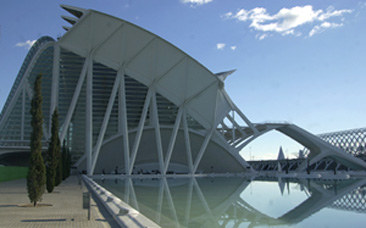 |
|

Javad
Amin Mansour (Iran), Ramsar COP8 Vice-President |
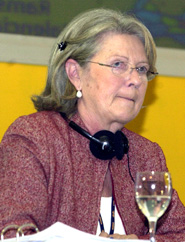
Maria
del Carmen Martorell Pallás (Spain),
Ramsar COP8 President |
|
MONDAY,
25 NOV. 2002
Delegates
met in Plenary to begin finalizing and adopting some of
the numerous resolutions on the agenda, completing their
work on 21 of these. Contact groups were held to help delegates
reach agreement on the remaining contentious issues, including
agriculture, climate change, culture, future COPs, the Strategic
Framework, and the World Commission on Dams (WCD).
WETLAND
INVENTORY:
On the resolution on a Ramsar Framework for wetland inventory
(COP8 DR 6 Rev.1), delegates agreed to a proposal by JAPAN
requesting Parties to give priority to wetlands inventory
projects for submission to the Small Grants Fund. The COP
adopted the resolution, as amended.
UNDER-REPRESENTED WETLANDS:
In the draft resolution on under-represented wetlands (COP8
DR 11 Rev.1), references were added to sandflats in the
section on mangroves and to sustainability of commercial
exploitation. Following consultations involving Norway,
Australia and the UK, delegates agreed
that the resolution should not focus solely on warm water
coral reefs.
MANGROVES:
Regarding the draft resolution on mangroves (COP8 DR 32
Rev.1), the PHILIPPINES supported the resolution
and the inclusion of language on sustainable use of mangrove
resources. WWF commended inclusion of, inter alia, unsustainable
aquaculture as a major threat.
|
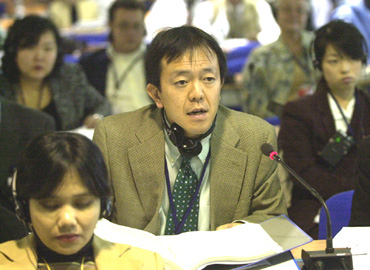
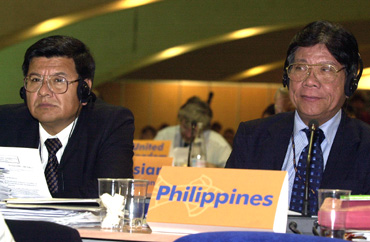
|
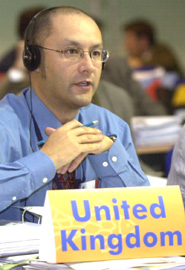
|
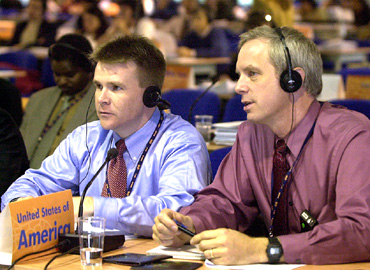 |
|
During
the Afternoon plenary session, the
WWF made a surprise entry and presented "gold"
and "dead" duck awards to 5 countries.
According
to the WWF, countries receiving gold ducks were chosen
on the basis of number of wetland sites protected,
size of sites and successful restoration of sites;
dead ducks were given to countries who failed to protect
wetlands in accordance with public pledges to do so
or who have been planning to destroy wetlands for
unsustainable development.
Spain
and Russia received "dead ducks". Algeria,
Bolivia and the United Kingdom received the Gold Duck
Awards. |
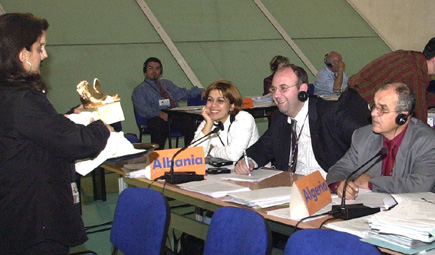 |
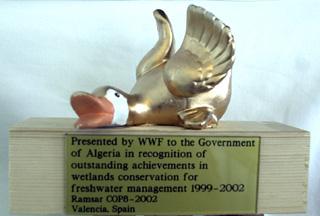
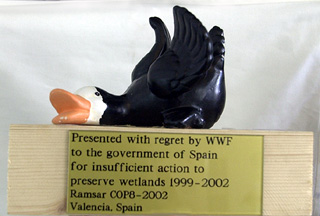
|
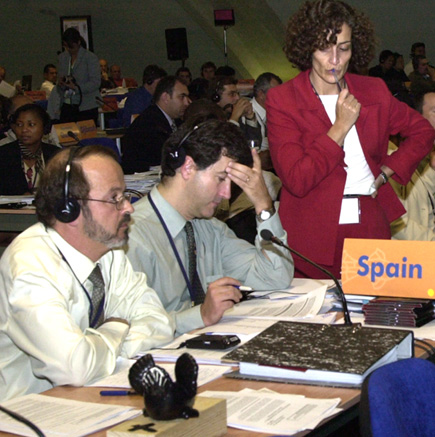
|
|
|
CONTACT
GROUPS
|
|
CLIMATE
CHANGE:
Parties considered a revised draft resolution (COP8
DR 3 Rev.2), agreeing to replace the annex with an
interim executive summary in the background document
(COP8 DOC.11).
SOUTH AFRICA, supported by AUSTRIA and BURKINA
FASO, proposed additional text requesting the STRP
to continue assessing new information on climate change
and make it available as an information paper. The
US expressed its reservations, and
agreed to consult informally on the issue.
Delegates worked through the text paragraph-by-paragraph,
resolving most of the remaining differences. Closing
the meeting, Contact Group Chair Peter Schei
(Norway) indicated that the two remaining disputed
issues would be taken up in Plenary.
|
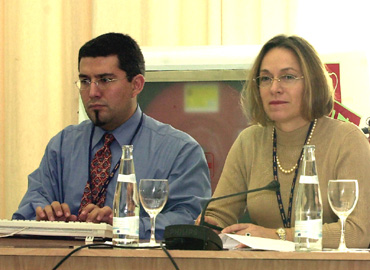
Members
of the Climate Change Panel
|
|
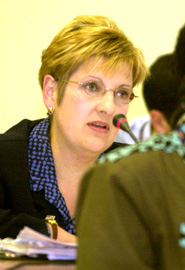
|
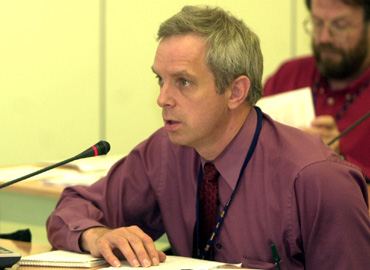
|
CULTURE AND WETLANDS:
In an afternoon meeting, delegates could not agree
on AUSTRALIA’s proposal
to delete text on the contribution of traditional
activities to wetland conservation and use, or
to add a reference to the WTO. They removed a
reference to the prior informed consent principle,
inserting instead references to the CBD and the
World Intellectual Property Organization. MEXICO
stressed difficulties with references to
“managing
cultural values.”
After reconvening in the evening, delegates agreed
to text recognizing that sustainable use of wetland
resources has created cultural landscapes of significant
value to wetland conservation, deleting language
referring to the contributions to conservation
by maintaining wetlands and “wise use.”
Delegates also agreed to text encouraging Parties
to consider using the Guiding principles to take
into account “exclusively” the conservation
of cultural values of wetlands. The Group agreed
to accept the principles, and concluded its work. |
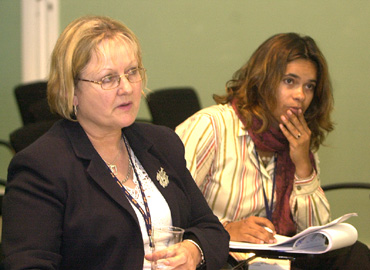
|
|
|
|
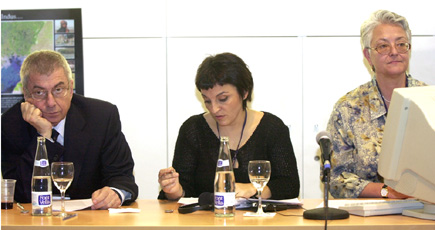
| Culture
and Wetlands Contact Group Panel |
|
CONTACT GROUP ON THE IMPLEMENTATION OF THE STRATEGIC
FRAMEWORK: |
|
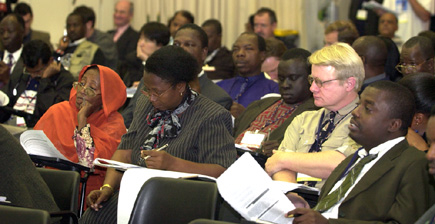
| Participants:
Implementation of the Strategic Framework
Group |
|
|

Chair
of the Contact Group |
|
African
delegates participating in the Contact Group on the
Implementation of the Strategic Framework agreed to
withdraw the region’s proposal for extensive
changes to the draft resolution (COP8 DR 10 Rev.2).
The Group adopted WWF’s proposal to extend appreciation
to additional International Partner Organizations,
and discussed inclusion of socio-economic and cultural
criteria in designation of Ramsar sites. |
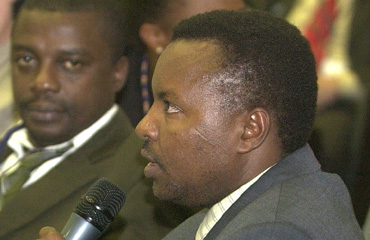
A
participant makes an intervention |
|
|
|
|
 Any
irregularities on this page? Please mail the Digital
Editor Any
irregularities on this page? Please mail the Digital
Editor
| Back to Linkages home | Visit
IISDnet | Send e-mail to ENB |
© 2002, IISD. All rights reserved.
|